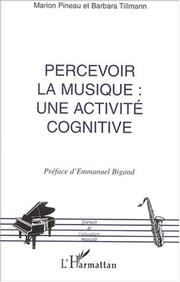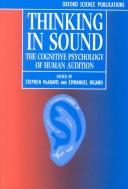| Listing 1 - 4 of 4 |
Sort by
|

ISBN: 2747507890 Year: 2001 Publisher: Paris Montréal Budapest [etc.] L'Harmattan
Abstract | Keywords | Export | Availability | Bookmark
 Loading...
Loading...Choose an application
- Reference Manager
- EndNote
- RefWorks (Direct export to RefWorks)
Musical perception. --- Music --- Musical analysis. --- Perception musicale --- Musique --- Analyse musicale --- Psychological aspects. --- Aspect psychologique --- 78.82

ISBN: 0198522576 0198522584 Year: 1993 Publisher: Oxford : Clarendon Press,
Abstract | Keywords | Export | Availability | Bookmark
 Loading...
Loading...Choose an application
- Reference Manager
- EndNote
- RefWorks (Direct export to RefWorks)
Auditory perception. --- Cognition. --- Listening. --- Perception auditive --- Ecoute (Psychologie) --- Cognition --- Auditory perception --- Listening --- Auding --- Attention --- Comprehension --- Educational psychology --- Hearing --- Psychology --- Sound perception --- Perception --- Word deafness
Book
ISBN: 9782817800349 9782817800356 9782817800332 2817800338 Year: 2010 Publisher: Paris Springer Paris
Abstract | Keywords | Export | Availability | Bookmark
 Loading...
Loading...Choose an application
- Reference Manager
- EndNote
- RefWorks (Direct export to RefWorks)
Reeducation consists in training people injured either by illness or the vagaries of life to achieve the best functionality now possible for them. Strangely, the subject is not taught in the normal educational curricula of the relevant professions. Reeducation thus tends to be developed anew with each patient, without recourse to knowledge of what such training, or assistance in such training, might be. However, new paradigms of reeducation are in fact possible today, thanks to advances in cognitive science and the development of new technologies such as virtual reality and robotics. In turn, they lead to the rethinking of the procedures of physical medicine, as well as of reeducation. The present book addresses primarily those professionals involved in reeducation: the clinician, kinestherapist, ergotherapist, speech therapist, psychometrician, clinical psychologist, and neuropsychologist. More generally, it addresses also those in occupations in physical rehabilitation and in both primary and ongoing education. The first part looks anew at reeducation in the context of both international classifications of functionality, handicap, and health and the concept of normality. The second part highlights the function of implicit memory in reeducation. And the last part, illustrated by practical examples, shows the integration of new cognition technologies in the new paradigms of reeducation. By its combination of theoretical approach and practical application, the work offers new therapeutic routes toward a better and more integrated functionality for the patient.
Psychology --- Social policy and particular groups --- Neuropathology --- rehabilitatie --- neuropsychologie --- sociale integratie --- Medical rehabilitation. --- Medicine, Physical.
Book

ISBN: 2753564116 2753510776 Year: 2018 Publisher: Rennes : Presses universitaires de Rennes,
Abstract | Keywords | Export | Availability | Bookmark
 Loading...
Loading...Choose an application
- Reference Manager
- EndNote
- RefWorks (Direct export to RefWorks)
Cet ouvrage de recherche fondamentale et appliquée intéressera non seulement les chercheurs et étudiants avancés de plusieurs disciplines situées au sein ou aux frontières des sciences cognitives (psychologie cognitive, psycholinguistique, neuropsychologie, neurosciences, musicologie…), mais aussi tous ceux qui aiment la musique. Il illustre le foisonnement récent des connaissances neuroscientifiques au sujet de la musique – art et jouissance de plus en plus présents dans notre vie quotidienne – et de ses relations avec le langage et les émotions. Les spécialistes les plus renommés y abordent la perception des structures musicales dans ses relations avec le langage (Barbara Tillmann et coll. ; Emmanuel Bigand et coll.), le rôle et l'importance des émotions dans la musique ainsi que les éventuels dysfonctionnements du traitement de ces émotions (Oliver Grewe et coll. ; Séverine Samson et coll. ; Régine Kolinsky et coll.), et, enfin, les troubles profonds d'origine congénitale des capacités musicales (Isabelle Peretz et coll.). Les principaux moyens d'investigation scientifique dans le domaine de la cognition musicale (comportemental, électrophysiologique, étude de patients et des activations cérébrales, simulation par « réseaux neuronaux ») y sont aussi représentés. Comme l'écrivent les organisateurs, dans le domaine de la musique, « en matière de connaissances scientifiques, que ce soit par le brassage des techniques ou par le métissage des domaines, notre défi pour le futur sera de chanter en chœur ».
Psychology, Educational --- émotions --- sciences cognitives --- langage --- musique
| Listing 1 - 4 of 4 |
Sort by
|

 Search
Search Feedback
Feedback About
About Help
Help News
News